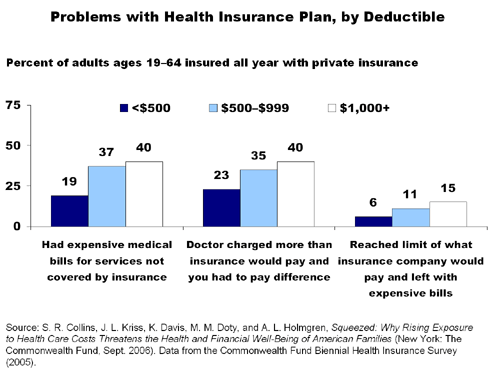As employers cope with rising health care costs by dropping health benefits for workers or increasing employee deductibles, working families are feeling the "squeeze," a Commonwealth Fund study finds.
As reported in Squeezed: Why Rising Exposure to Health Care Costs Threatens the Health and Financial Well-Being of American Families, people who turn to the individual insurance market often find they don't qualify for any of the plans available, or simply can't afford their often high cost. An overwhelming proportion—89 percent—of working-age adults who sought coverage in the individual market during the past three years ended up never buying a plan, according to the Fund's national 2005 Biennial Health Insurance Survey, the basis for the report.
A majority of survey respondents who sought coverage found it very difficult to find an affordable individual insurance plan, while one-fifth were turned down, were charged a high price because of a preexisting medical condition, or had a health problem excluded from coverage.
"More workers and their families are losing employer-sponsored health insurance," said Fund Assistant Vice President Sara R. Collins, Ph.D., lead author of the report. "Most of the increase in the number of uninsured Americans—now upwards of 46.6 million—was due to a decline in workplace coverage. Although the individual market is a last resort for those shut out of employer-sponsored coverage, it is by no means a safe or secure haven for everyone."
The report also finds that Americans with high-deductible health plans—whether through the individual market or through an employer—have higher out-of-pocket costs than people with lower-deductible plans. Many who have these plans are left with burdensome medical bills because of limits to their insurance coverage: for example, two of five (40%) people with deductibles over $1,000 had expensive medical bills for services not covered by their insurance, compared with about one-fifth (19%) of those with deductibles under $500.

Among the study's other findings:
Individual health coverage is more expensive than group coverage.
- Forty-three percent of survey respondents with individual coverage spent 5 percent or more of their income on health plan premiums, in contrast to 14 percent of those with employer-sponsored coverage.
- More than one-third (37%) of adults with individual coverage have annual deductibles of $1,000 or more.
Higher deductibles are linked to poorer access to care and lower satisfaction.
- Adults with high deductibles are less satisfied with the quality of the health care they have received: less than one-third (29%) of those with deductibles over $1,000 are very satisfied with the quality of their care, compared with over half (54%) of those with deductibles under $500.
- Forty-four percent of those with deductibles over $1,000 experienced problems accessing care—for example, they did not fill a prescription or skipped a recommended test or follow-up visit because of the cost. The same was true for a much smaller proportion (25%) of those with deductibles under $500.
- One-fifth (22%) of adults with higher deductibles took on credit card debt to pay medical bills, compared with just 8 percent of those with lower deductibles.
"Increasing the amount people pay for their health insurance and health care imposes a burden on low- and moderate-income families," said Fund President Karen Davis, commenting on the report. "We need a national solution following the lead of states like Maine, Massachusetts, and Vermont that have expanded coverage through shared financial contributions from individuals, employers, and government."